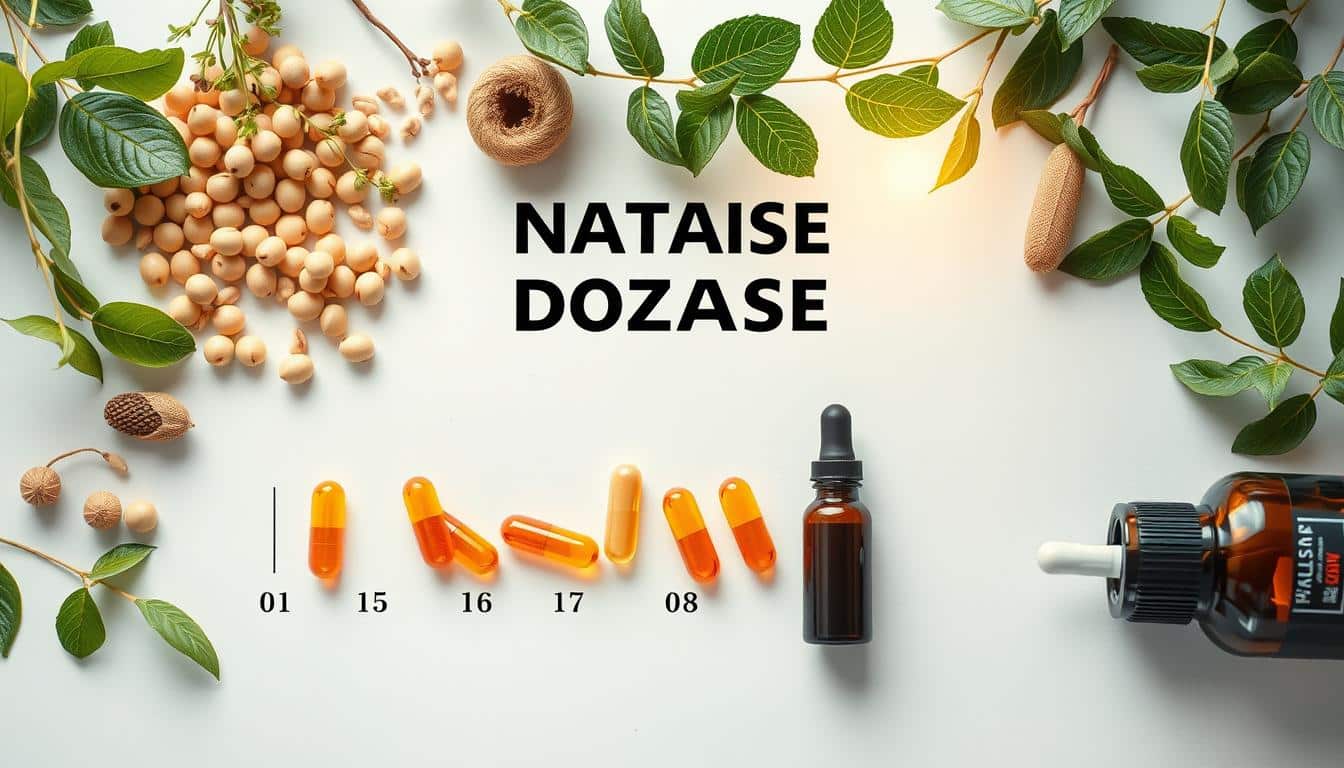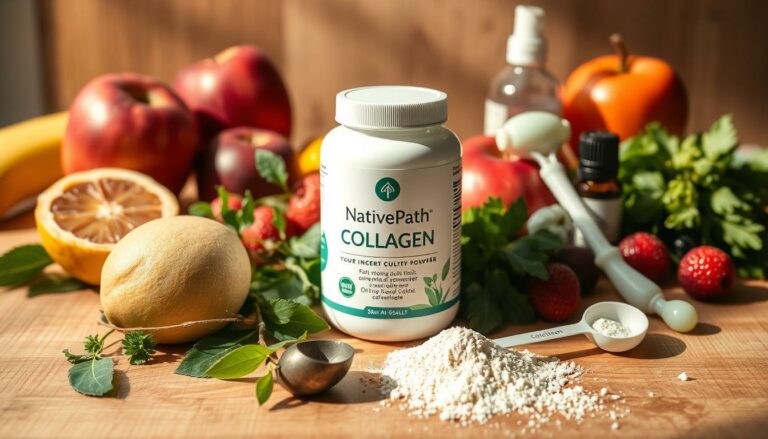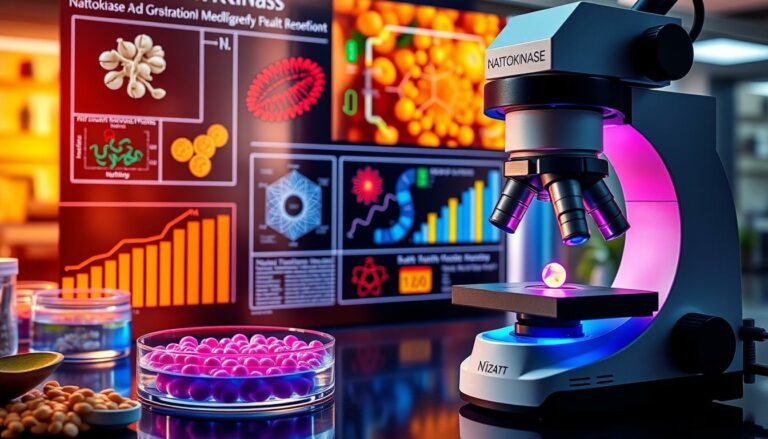Nattokinase Dosage Recommendations – Complete Guide
Let’s start right off with Nattokinase Dosage Recommendations. Did you know that just 50 grams of natto, a traditional Japanese dish, has about 1,000 fibrinolytic units (FU) of nattokinase? This enzyme, made from fermented soybeans, is getting a lot of attention. It might help your heart and prevent blood clots. Knowing how much to take is key for its health benefits.
Nattokinase is a strong enzyme from fermented soybeans. It’s known for helping your heart and stopping blood clots. As it becomes more popular, finding the right amount is important. This guide will help you understand how much to take for the best results.
If you’re thinking about taking nattokinase or want to change your dose, this guide is for you. It offers tips on safe amounts and how to use it in your health routine. We’ll talk about how it works and any possible side effects. This will help you make smart choices for your heart health.
Key Takeaways
- Nattokinase is a potent enzyme derived from fermented soybeans with possible heart benefits
- Proper dosage is key for the best results and safety
- Nattokinase may help your heart and prevent blood clots
- Knowing the right amount is vital for safe use
- This guide offers evidence-based advice for nattokinase use
- Always talk to a doctor before starting any new supplement
What is Nattokinase?
Nattokinase is a strong enzyme from natto, a Japanese food. It’s known for helping heart health. People are curious about how much to take.
Overview of Nattokinase
Nattokinase comes from soybeans fermented with special bacteria. This method is from Japan. It’s rich in nutrients and might help with blood clots and heart health.
Sources of Nattokinase
Nattokinase mainly comes from natto, a soybean dish in Japan. If you don’t like natto, there are other options. Supplements are also available, with different amounts needed for everyone.
Key Benefits of Nattokinase
Studies show nattokinase might help in many ways:
- Supporting heart health
- Potentially lowering blood pressure
- Preventing hardening of arteries
- Having anti-inflammatory effects
But, talk to a doctor before taking nattokinase, if you’re on certain meds.
| Nutrient | Amount per 100g of Natto | % Daily Value |
|---|---|---|
| Iron | 8.6 mg | 48% |
| Manganese | 1.9 mg | 95% |
| Vitamin K | 775 μg | 646% |
Recommended Dosage Guidelines
Knowing how much nattokinase you need is important. The right amount can change based on your health goals and needs.
Typical Daily Intake
Most adults should take 100 to 200 mg of nattokinase each day. This helps keep your heart healthy and supports your overall health.
Considerations for Individual Needs
Your body might need more or less nattokinase. This depends on your age, weight, and health. Start with a small dose and add more if needed.
Adjusting Dosage for Specific Conditions
If you have health issues, your doctor might suggest a different dose. People with heart problems or at risk of blood clots might need more. Always talk to a doctor before starting or changing your nattokinase, if you have health problems or take medicine.
| Condition | Potential Dosage Adjustment |
|---|---|
| General health maintenance | 100-200 mg daily |
| Cardiovascular support | 200-400 mg daily |
| Blood clot prevention | 300-500 mg daily |
These are just general tips. The right amount of nattokinase can be different for everyone. It’s important to check in with a doctor to find what works best for you.
Nattokinase and Heart Health
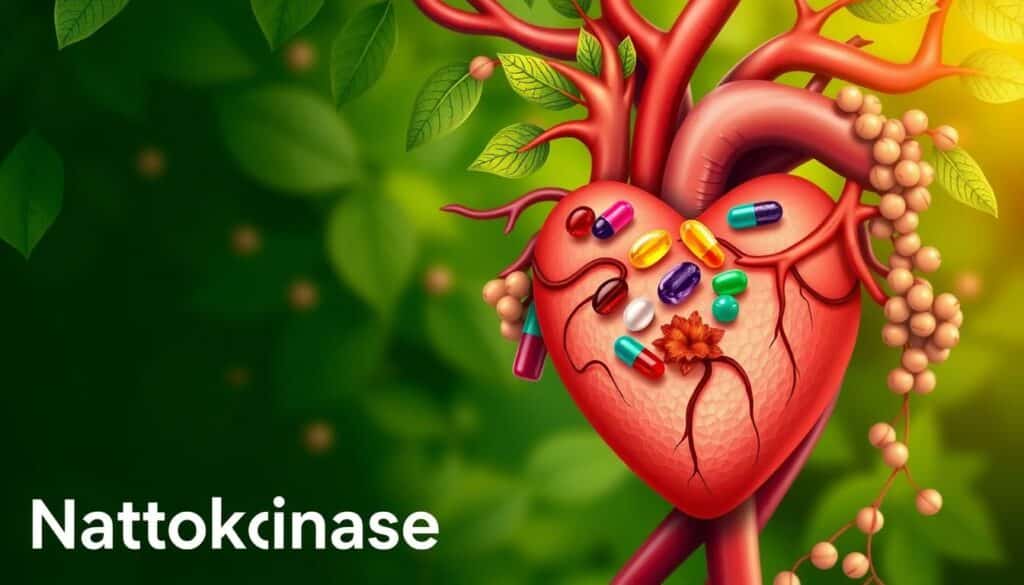
Nattokinase is an enzyme from fermented soybeans. It might help your heart. Knowing how much to take is key.
Impact on Blood Pressure
Research says nattokinase could help keep blood pressure healthy. The right amount to take for blood pressure is different for everyone. But studies show it could be very helpful:
| Blood Pressure Category | Systolic Reduction | Diastolic Reduction |
|---|---|---|
| Pre-hypertension | 5-8 mmHg | 2-4 mmHg |
| Stage 1 Hypertension | 10-13 mmHg | 5-7 mmHg |
Benefits for Cardiovascular Function
Nattokinase helps blood flow better and lowers clot risk. It works well with other heart supplements:
- Vitamin K: A supercharged supplement delivers 2,000 mcg of K1 and 1,500 mcg of K2
- Combination: Nattokinase with vitamin K supports healthy blood flow
“98% of customers highly recommend Life Extension products to family and friends, showing trust in nattokinase supplements.”
Even though nattokinase looks promising, talk to a doctor first. This is true if you have heart problems or take blood pressure meds like Aceril 2.5mg Tablet.
Nattokinase for Blood Clot Management
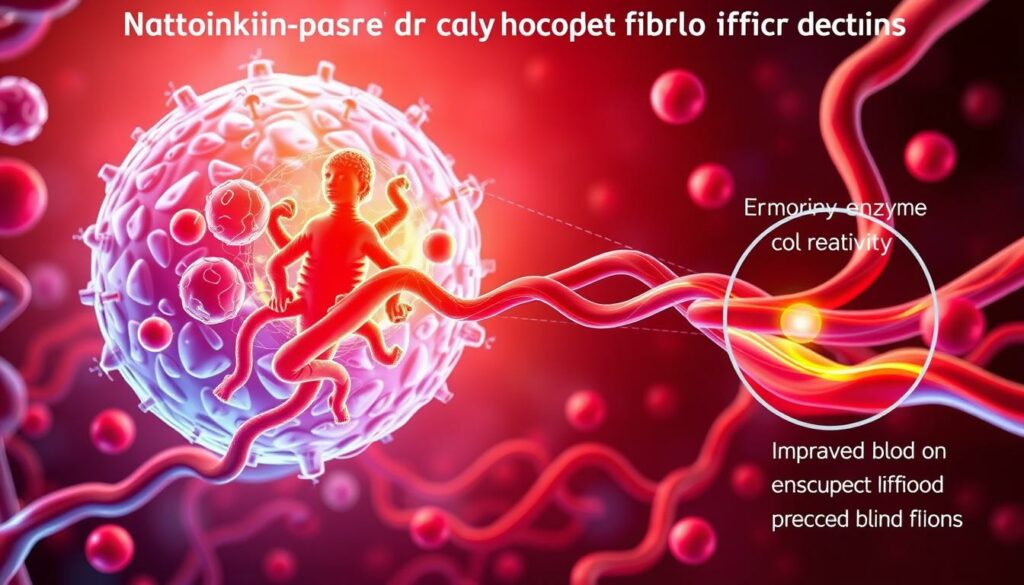
Blood clots are very dangerous. Nattokinase, made from fermented soybeans, might help. It’s good to know how it works and what studies say. This can help find the right amount of nattokinase for health.
Mechanism of Action
Nattokinase breaks down fibrin, a protein in blood clots. It makes blood thinner, like medicine but without side effects. It helps blood flow well and keeps the heart healthy.
Clinical Studies and Findings
Studies on nattokinase are exciting:
- One study found it lowers the risk of blood clots in travelers.
- Another showed better blood flow and lower blood pressure in users.
- Research suggests it can dissolve clots and stop new ones.
These studies mean nattokinase could be very good for the heart. More research is needed, but it looks promising. It might help with blood clots and keep blood flowing well.
“Nattokinase’s ability to dissolve fibrin and improve blood flow makes it a promising natural option for maintaining cardiovascular health.”
Always talk to a doctor before taking nattokinase. They can help find the right dose for you.
Nattokinase and Its Role in Inflammation

Inflammation helps protect our bodies. But, too much can cause health problems. Nattokinase, from fermented soybeans, might help with this.
Understanding Inflammation
Inflammation is how our bodies react to harm or sickness. It’s good for healing but bad if it lasts too long. It can hurt our hearts, diabetes, and joints.
Nattokinase’s Anti-Inflammatory Properties
Studies say nattokinase might lower inflammation in our bodies. This could help with long-term inflammation problems. But, we need more research to be sure.
How much nattokinase is safe varies for everyone. Most take 100 to 200 mg a day. Always talk to a doctor before taking new supplements.
| Benefit | Potential Impact |
|---|---|
| Reduced Inflammation Markers | May lower risk of chronic diseases |
| Improved Cardiovascular Health | Possible reduction in heart disease risk |
| Enhanced Blood Flow | May improve overall circulation |
Nattokinase might help, but it’s not a magic fix. Eating right, exercising, and seeing doctors are also important for health.
How to Incorporate Nattokinase into Your Diet
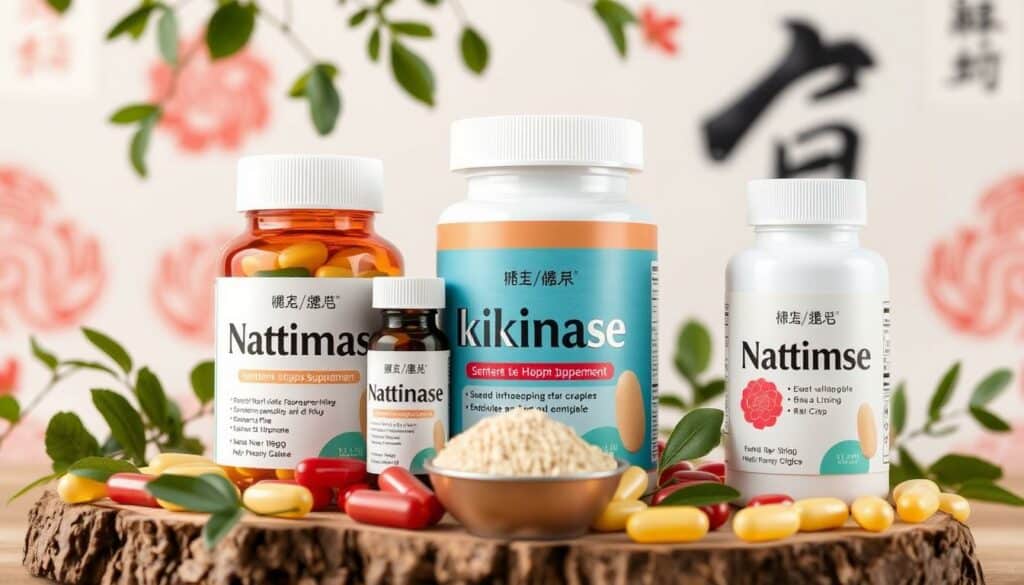
Adding nattokinase to your diet can help your heart and blood flow. Knowing how much to take is key for the best results.
Dietary Sources of Nattokinase
Natto, a Japanese food, is full of nattokinase. It’s made from fermented soybeans. But, its strong taste might not be for everyone.
For other options, DGL supplements offer digestive help and nattokinase.
Supplement Forms Available
Nattokinase supplements come in many forms:
- Capsules
- Tablets
- Powders
When picking a supplement, check the nattokinase activity units (FU) per dose. Most have 1000 to 4000 FU per serving. This meets the daily needs.
Remember, nattokinase supplements might affect blood thinners. Always talk to a doctor before starting any new supplement, if you’re on meds or have health issues.
“Adding nattokinase to your diet can be a game-changer for cardiovascular health, but it’s important to find the right form and dosage for your needs.”
While supplements help, a balanced diet is the best health base. Use nattokinase smartly as part of your health plan.
Potential Side Effects of Nattokinase

Nattokinase is a strong enzyme from fermented soybeans. It has many health benefits. But, knowing its side effects is key for safe use. Let’s look at common side effects and when to be careful with nattokinase.
Common Side Effects
Nattokinase is usually safe, but some people might feel mild side effects. These can include:
- Gastrointestinal discomfort
- Headache
- Skin rashes
- Dizziness
These side effects are usually mild. They often go away as your body gets used to the supplement.
When to Avoid Nattokinase
Nattokinase isn’t for everyone. It can interact badly with some conditions and medicines, even at safe doses. You should not take nattokinase if you:
- Have a bleeding disorder
- Are scheduled for surgery
- Take blood-thinning medications
- Are pregnant or breastfeeding
Always talk to your doctor before starting any new supplement. This is very important if you have health issues or take other medicines.
| Condition | Recommendation |
|---|---|
| Bleeding disorders | Avoid nattokinase |
| Upcoming surgery | Stop nattokinase 2 weeks prior |
| Taking blood thinners | Consult healthcare provider |
| Pregnancy/Breastfeeding | Avoid due to insufficient safety data |
Nattokinase Interactions with Medications
It’s key to know about nattokinase and how it works with other medicines. Nattokinase comes from fermented soybeans. It affects blood clotting and heart health. So, knowing how it interacts with drugs is important.
Blood Thinners and Nattokinase
Nattokinase helps thin blood, which is good for some but not all. It can change how well your body works with blood thinners. Here’s a look at how nattokinase compares with common blood thinners:
| Aspect | Nattokinase | Common Blood Thinners |
|---|---|---|
| Origin | Natural (fermented soybeans) | Synthetic |
| Mechanism | Dissolves fibrin | Inhibits clotting factors |
| Side Effects | Generally fewer | Can be more severe |
| Monitoring | Less frequent | Regular blood tests required |
Consulting Your Healthcare Provider
Before you start nattokinase, talk to your doctor. They can figure out the best dose for you. This is very important if you’re on:
- Anticoagulants like warfarin
- Antiplatelet drugs such as aspirin
- Blood pressure medications
Your doctor will check risks and adjust your plan. They might change dosages or suggest other options. This ensures nattokinase works well for you without harming your health.
While nattokinase has benefits, it can also interact with other medicines. This might affect how well it works and how safe it is. Always talk to your doctor before adding nattokinase to your routine.
Monitoring Your Response to Nattokinase
Watching how your body reacts to nattokinase is important. It helps you know if you’re using it right. Knowing the signs of it working and when to change your dose is key.
Signs of Effectiveness
Nattokinase’s effects can be small and take time to notice. Some signs it’s working include:
- Improved blood pressure readings
- Better circulation
- Reduced symptoms of cardiovascular issues
It’s important to get regular check-ups and blood tests. This helps track how nattokinase is affecting you. Keep a log of your health to see how you’re doing over time.
When to Adjust Dosage
Changing your dosage should only be done with a doctor’s help. This is very important if you’re taking other medicines or have health problems. Your doctor might suggest changing your nattokinase dose based on:
- Blood test results
- Changes in your health status
- Interactions with other medications
Finding the right amount of nattokinase for you is a personal thing. What works for one person might not work for another.
| Indicator | Action |
|---|---|
| No change in symptoms | Consult doctor about possible dosage increase |
| Significant improvement | Keep the current dosage |
| Side effects appear | Think about lowering the dosage |
Tips for Choosing a Quality Nattokinase Supplement
Choosing the right nattokinase supplement is key for good health. Look for products from trusted brands. They should share how they source and make their supplements.
Identifying Reputable Brands
Check if the brand lists fibrinolytic units (FU) per dose. This shows how strong the supplement is. Good supplements have 2,000 to 4,000 FU per serving. Think about how well your body can use it and what else is in it.
Certification and Testing Information
Third-party tests and certifications mean a supplement is safe and pure. Find products tested by outside labs and approved by known groups. This means the supplement meets high standards and has the right amount of nattokinase.
| Certification | Description | Importance |
|---|---|---|
| USP Verified | Meets U.S. Pharmacopeia standards | Ensures purity and potency |
| NSF Certified | Meets NSF International standards | Confirms product safety |
| GMP Certified | Follows Good Manufacturing Practices | Guarantees quality production |
Using nattokinase with other supplements can help more. For example, vitamin K is good for your heart and bones. A top-rated vitamin K supplement shows how mixing supplements can improve your health.
Frequently Asked Questions About Nattokinase
More people are curious about nattokinase. They want to know how it works and if it’s safe. We’ll clear up some common myths and talk about how much to take.
Common Myths
Some think nattokinase can replace blood-thinning drugs. But it’s not a full replacement. It helps with heart health, but you should talk to a doctor first.
The right amount of nattokinase varies for everyone. Always check with a healthcare expert before changing your meds.
FAQ
What is the recommended daily dosage of nattokinase?
How does nattokinase support heart health?
Can nattokinase interact with blood-thinning medications?
What are the possible side effects of nattokinase?
How long does it take to see the effects of nattokinase supplementation?
Can nattokinase replace prescribed blood-thinning medications?
How should I choose a quality nattokinase supplement?
Is nattokinase safe for pregnant or breastfeeding women?
Can nattokinase help with inflammation?
Are there any dietary sources of nattokinase beside supplements?
Source Links
- Probiotics as Alternative to Antibiotics in Poultry: Challenges and Prospects
- Vitamin K – Life Extension
- Colostat 10mg Tablet: View Uses, Side Effects, Price and Substitutes | 1mg
- Cheese’s secret weapon: does swiss cheese hold the answer to vitamin k2 deficiency? – DeliFo
- Aceril 2.5mg Tablet: View Uses, Side Effects, Price and Substitutes | 1mg
- Metabolites

